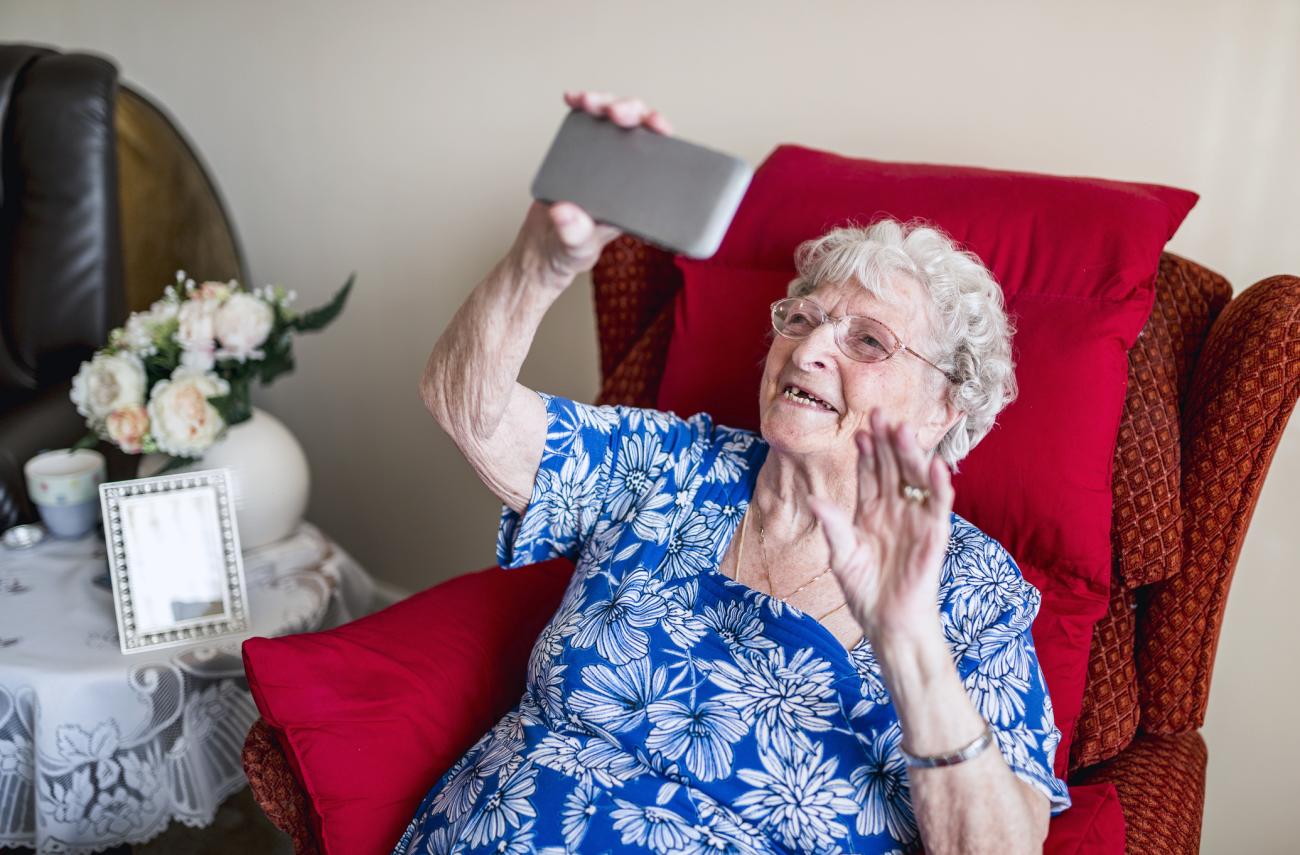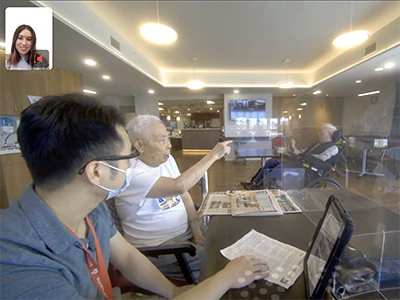
People living with dementia can feel more connected to family members and experience things that are dear to them at the click of a button.
A picture is worth a thousand words for people living with dementia who were given access to a digital application prototype developed by Vancouver Coastal Health Research Institute researcher Dr. Lillian Hung. The co-designed WhatMatters app puts fond reminders of family members, friends and interests directly into the hands of patients and care providers.
“These days, families are very global,” says Hung. “This technology makes it possible for people living with dementia to see their daughter in Japan or son in France whenever they want to, or listen to a favourite song or read an encouraging message.”

Hung and her team co-developed WhatMatters in collaboration with researchers from UBC, Emily Carr University of Art + Design, Simon Fraser University and the University of Waterloo in partnership with a mobile app company. The co-designed project — discussed in detail in Hung’s study published in the International Journal of Geriatric Psychiatry — also involved input from researchers in nursing, engineering, computer science and health design, as well as patient partners, family caregivers and care staff.
“We used the co-design approach to help ensure that the final product is relevant to and user-friendly for persons living with dementia, family members and staff, as they are the ones who will ultimately use the app,” states Hung.
The co-design participatory approach can empower stakeholders, which may include community members, patients and health care workers. Watch this video:
“The idea for the app came directly from family members who shared how difficult it can be when they cannot be near their loved one on a regular basis,” notes Hung. “They worried that this absence may cause undue stress to their loved one, and wanted another way to be able to soothe and comfort them.”
The resulting personal, private, secure and family-controlled WhatMatters app enabled family members to curate a library of digital media shown to bring comfort to the person living with dementia — a condition that includes a cluster of diseases associated with cognitive decline and memory loss.
“WhatMatters is designed to support person-centred care for people with dementia that recognizes their unique personalities, needs and values.”
During the pilot study, family members provided the content to upload onto the WhatMatters app. With a click of a button, the app displayed a checkerboard of image and text prompts, often on a tablet, that guided the viewer through the available media content. A text-based introduction to the person with dementia provided an additional touch point in support of person-centred care.
The app’s media library included everything from images of relatives and the person with dementia’s favourite pastimes to music videos and written and audio message words of encouragement from loved ones. Family members uploaded videos of themselves discussing care management interventions, such as taking medications and self-soothing techniques. Users could also interface with the app by liking or disliking certain media library content, which influenced content management decisions made by family members and care staff.
An increased sense of connection to family and health care providers
WhatMatters came in particularly handy at times when family members were not available, such as at night, or when needed on the spur of the moment, says Hung.
For example, while participating in a workshop, a gentleman with dementia became physically agitated and displayed signs that his distress could quickly escalate.
“Care providers opened the app and clicked on images of hockey loaded onto the platform,” recalls Hung. “This sparked a conversation about hockey with the person with dementia, calming him and de-escalating the situation.”

After rejoining the workshop, the person with dementia drew a picture of a heart to express how he felt about the overall experience.
“Instead of needing to use other approaches to protect the patient and care providers from injury, such as medication or restraint, he was given a topic that tapped into passions, relieving the stress of the situation and uplifting his spirits,” states Hung.
A positive approach to care that considers a person’s strengths
In Canada, more than 600,000 people live with dementia. This number could rise to approximately 1 million people by 2030, according to the Alzheimer Society of Canada.
WhatMatters can give care providers an entry point to discuss care interventions, such as medication and therapy, states Hung. “When a patient feels safe, respected and calm, they are more receptive to receiving care suggestions, which is also safer for staff and a more positive way to engage with the patient.”
This video describes how the WhatMatters app provides entertainment, social connection and comfort for individuals living with dementia in long-term care and hospital settings:
“Many different care providers may interact with a person with dementia over the course of a day or week,” adds Hung. “WhatMatters gives them a quick way to learn a little bit about the person and what brings them joy to assist in the care journey.”
This type of intervention can also help streamline care, putting a patient-tailored, non-invasive and positive intervention at the fingertips of care providers and family members, says Hung.
Hung and her team are entering the second phase of the WhatMatters project to further assess the outcomes and feasibility of the digital solution. Learn more about the WhatMatters app on the IDEA Lab website.


